» Next Entries
The Archives
-
Experience Design, Marketing, Travel & Tourism
Cascading influence in tourism marketing
05.16.12 | Permalink | 4 Comments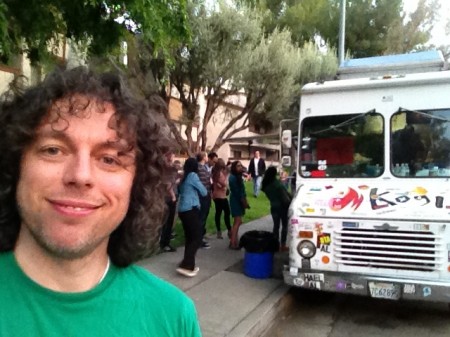
I’m not a foodie. But I like food. I like cooking. I like to eat good food. I like authentic experiences. I like holes in the wall. I once drove 5 hours to eat deep fried cheese. And when I was in LA last month I drove an hour to visit the Kogi food truck (photo). But I don’t really watch food shows, read food blogs or base every restaurant I visit on reviews on Yelp or Tripadvisor.
I have friends for that.
My friend Stephanie is a foodie. She tries crazy recipes and knows about all the new and hot restaurants in town. And beyond. There aren’t a lot of cities I travel to where she doesn’t know of someplace amazing.
Stephanie is not a big food influencer. She doesn’t blog, doesn’t take photos of her food, she doesn’t pin food recipes. She does influence her friends though. In person or on Facebook. And if she recommends a restaurant, I’m going.
I’m not a foodie. But I’m influenced by one.
Stephanie in turn, is influenced by a host of people who share her obsession with food. She’s part of a passionate community of foodies. A lot of her friends are foodies, she watches Food TV, reads a lot of food blogs, is active on Chow and follows celebrity chefs on Twitter.
Stephanie is a foodie. She makes her decisions based on information from influencers in the foodie community.
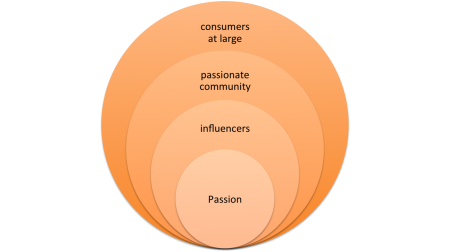
The example above is the essence of modern tourism marketing. Restaurants will get people like me in the door because I’m influenced by a foodie, who in turn is influenced by leaders in the foodie community.
As a marketer, you need to approach this in reverse. Activate the influencers who connect with the passionate community, who in turn connect with consumers at large.
This works for any kind of niche. Hiking, skiing, modern art, theatre, gambling, roller coasters, etc. There are thousands of passionate communities and each community, large or small, has influencers. It’s just a matter of activating it.
As a tourism marketer you need to identify your niches and ensure the delivery of your experience is remarkable so people will recommend your destination or product. It will start a cascading effect that produces long term results.
-
Management, Marketing, social media, Travel & Tourism
5 levels of social media sophistication at the DMO
04.23.12 | Permalink | 34 Comments
Imagine you had to start a DMO. Your DMO. You have been given the same budget and must start from scratch. Would your DMO look exactly the same as it does now? The same departments, same positions? The same budget allocations? The same marketing tactics?
The internet, and social media in particular, have completely changed tourism marketing. Forever. People might not talk on Facebook about which fabric softener they use or which soft drink they prefer, but everybody talks about their travels. Social media sophistication is crucial to modern marketing. Yet the tourism industry is way behind.
We have worked with dozens of DMOs around the world, ranging from very small to very large. And we have spoken to hundreds more. Based on our conversations and experiences we have identified the following levels for social media adoption and integration into the organization.
1) Ignoring social media
This level represents DMOs who are not active at all in social media. Social media is seen more as a threat than an opportunity.Characteristics you can find at this level are:
- Leadership that is very skeptical of social media (“Facebook is a waste of time,” “I don’t care what my old high school buddy had for dinner last night,” “Twitter is for young people,” etc.)
- Fear of negativity
- Restricted staff access to social networking sites through policies or technology
- Lack of an internal social media champion
- Lack of social media knowledge at marketing agencies
- Traditional marketing methods
- No budget for social media
Two years ago, there were many DMOs at this level, but by today most have moved on. Most DMOs that remain here are tied to very restrictive government policies.
2) Experimenting with social media
DMOs experiment with social media without a specific strategy through random tactics.Characteristics you can find at this level are:
- Leadership that is skeptical, does not know activities are happening, ignores them because of disinterest, allows it because an influential stakeholder asked questions, or is swamped dealing with politics
- Fear of negativity and overreaction when something “bad” happens
- Enthusiastic internal champions who have created rogue accounts but sometimes lack skills to properly execute. These people eventually leave the organization to properly grow their skills elsewhere
- Hit or miss results
- Chasing anything that is new and hot
- Lack of social media knowledge at marketing agencies
- No or very little budget
- No metrics
There are still a lot of DMOs operating at this level. It often takes a noticeable event to move them to the next level. This could be spurred by a social media success internally or by the DMO next door. For example, a rival’s viral YouTube video or growing number of Facebook fans.
3) Social media supporting marketing campaigns
Due to a lack of strategic knowledge, DMOs incorporate social media in paid, outbound marketing campaigns. Often this is an add-on to traditional marketing campaigns, such as a YouTube channel showing videos originally made for TV or using Facebook and Twitter to broadcast campaign messaging.Characteristics you can find at this level are:
- Leadership that realizes social media can be powerful but still relies/insists on traditional methods because they are more comfortable with them, or do not know how to measure and compare the difference in results
- Marketing agencies that reluctantly incorporate social into campaign strategies, often as an afterthought and/or without understanding social media principles
- Little integration or collaboration with members/partners/industry
- Heavy scheduling and approval processes for social media activity
- Broadcast-style communication in social media
- Viewing and communicating with fans and followers in a traditional outbound marketing way, such as a consumer email database
- Year-round efforts on Twitter, Facebook, etc., that lack strategic direction
- Social media black-outs when there is no campaign in market
- Frustrated and/or maxed-out staff who understand the potential of social media but are not heard by leadership and sometimes need/want more training
- Often staff skilled in social media leave the organization out of frustration
- Budget that is a small portion of marketing campaigns
- Lack of appropriate metrics, with success often measured either by big numbers (# of fans/followers) or a campaign’s level of creativity
Most DMOs operate at this level, sometimes with some additional effort to keep Facebook and Twitter going year-round. Often the level of success depends on the sophistication of one or two staff members.
DMOs at this level want to succeed but cannot break out of the traditional way of doing business. Getting to level four is usually achieved by having a strong social media success as part of a bigger initiative or having an epiphany that social requires a different way of thinking. Usually, level two experiments continue alongside level three activity.
4) Following a social media strategy
This level is typified by a DMO having a social media strategy in place or having social media integrated into its marketing strategy. The DMO still believes that it is in full control of the destination brand.Characteristics you can find at this level are:
- Leadership that understands social media and has given it dedicated resources
- Marketing campaigns that have social at the core
- Agencies in place that are dedicated to social or a digital agency that (really) gets social
- Social strategies in place tied to marketing goals and objectives
- Stronger alignment/integration with members/partners/industry and other stakeholders
- A move from mass to niche marketing
- Activities that are measured and adjusted in real time
- Staff that is trained in social media
- Empowered staff that is allowed and encouraged to participate as a DMO professional in social networks
- Social media monitoring and engagement that is in collaboration with members/partners/industry
- Social media that is incorporated in customer service
- Relaxed social media access policies and limited approvals for posting content
- Crisis plan in place
- Systematic experimentation that is part of the strategy
- Dedicated staff and budget for social media
Leading DMOs have entered this level. Over the next few years we expect a rush of DMOs moving here. DMOs that enter level four first are the ones with less restraining operating environments (such as funding) with innovative leaders and marketing managers.
5) Embracing the social business model
The level five social business recognizes that the destination’s story and reputation are based on visitors’ experiences at every touch point during their trips (see point 1 in “Top 5 Wrong Assumptions in Destination Marketing”). This DMO knows and accepts that it is no longer in control of the destination story. It recognizes and acts on the need to collaborate closely with its industry, residents, influencers and visitors, and that it must change the way success is measured.
The level five DMO starts with the core of the passions that make a destination relevant and leads all partners that have an impact on those experiences. The sole focus is on delivering outstanding visitor experiences that are unique to the destination, and then making it easy for visitors to share these experiences in their own voices.
As painful as it may be, the DMO re-organizes, ending much of its old way of doing business. Staff is re-trained and assigned to new activities.
Characteristics you can find at this level are:
- Leadership that understands that business models from 15 years ago must change and is willing to undertake the pain of changing the organization
- Relentless focus on the consumer
- Majority of marketing resources are allocated to digital
- A shift from destination marketing to destination management, where the customer experience is seen as the primary way to build brand
- Marketing strategies that are a collaborative effort between the DMO, industry, residents, passionate consumers and other stakeholders
- A move from mass marketing to niche marketing
- Culture of collaboration, internally as well as with members/partners/industry and even consumers
- Flattened organizational hierarchy to increase efficiency and speed needed to respond and adjust quickly
- Lean processes
- Staff that is trained, empowered and supported to make decisions without requiring lengthy approvals or spending time in meetings designed by management to control every aspect of every tactic
We’re not aware of any DMOs at level five. We have spoken to many DMO executives who know they need to get here and want to get here. Often, their funding models or destination-specific politics stand in the way.
The DMO closest to a level five we are familiar with is Visit Sørlandet in Southern Norway. As a newly created regional DMO, this organization quickly realized it would be impossible to build a Southern Norway brand the traditional way. By creating a strategy based on collaborating with local DMOs and industry members to improve the visitor experience and elevate the collective digital marketing efforts, Visit Sørlandet is building it’s brand through every touchpoint while growing repeat visitation and encouraging word-of-mouth.
For many DMOs that have not reached level four, level five may seem pie in the sky. But the further you move your DMO through the levels, the more you realize just how much the world has changed and the true impact this has. Once you enter level four, you can see level five. It is no longer pie in the sky. It is tomorrow.
At what level is your DMO?
Your DMO’s current level is not a sign of success or failure. Every DMO is different. Politics and funding models have a big impact. So does the size and scope of a DMO. A country DMO is different from a city DMO. This affects specific marketing strategies and tactics.It is also not a race. It is a process that organizations need to go through. Some might skip a step. For others, the levels could overlap. But in order for DMOs to stay relevant and effective, they need to climb up.
We have worked with DMOs in all shapes and sizes at every level of this process. We enjoy helping DMOs make the climb.
We have conducted audits, started Facebook pages, trained staff, implemented social media as part of bigger campaigns, run social campaigns, created strategies, helped to define entire business plans centered around social principles and much more.
Inventing the future
Alan Kay, the inventor of the GUI and object-oriented programming once said, “The best way to predict the future is to invent it.” Instead of all DMOs trying to invent level 5 independently, we think the best future is that we all invent it together and collectively stay relevant. Please share your thoughts in the comments.As always, thanks for all my Think! coworkers for their contributions in creating this post
-
Internet, Marketing, Travel & Tourism
Making conferences social

Conferences are inherently social. People gather to learn and discuss topics that they are passionate about with people who care as much about it as they do. Yet the way conferences are created and promoted are incredibly traditional.
There’s a better way: bake social into the conference.
A good example is the Social Media Tourism Symposium Think!’s very own Dave Serino started in 2010. The mission statement describes what the conference is all about:
The symposium is a combination of destination marketing organizations, hotels, resorts, attractions and any other tourism related entities sharing ideas and learning more about how social media is effecting promotion within the travel industry.
What makes this conference unique is the involvement of attendees throughout the entire process. Attendees will have a voice in everything from the location to the session topics and presenters.
By involving the people who care about the subject matter in the planning process, Dave creates a conference that is more relevant and, therefore, more likely to be attended by the people who helped create it. Because all of this happens in social media, people who care are also promoters of the event.
For example, the destination selection process is driven by the SoMeT Facebook community. DMOs respond to an RFP and the Facebook community votes where the conference is going to be held. The 2012 selection process is entering the final stages.
In the process, people also get to know each other. They make friends online and want to attend the conference to meet those new friends.
This is what conferences are all about. Going to a cool place, learning relevant things and meeting new friends. By baking social media into the conference itself (instead of looking at it as an advertising vehicle) you make conferences more relevant with attendees who feel strongly connected and want to help make the event a success.
-
leadership, Marketing, social media, Travel & Tourism
I’ve seen the future of travel media
08.30.11 | Permalink | 13 Comments
Steve Keenan, online travel editor from the London Sunday Times summarizes Valencia’s unique approach to a media/blogging famValencia Leads
A few weeks ago the Valencia Tourism Region hosted a blog trip (#blogtripF1) and it could very well be the new standard for DMOs to model their traditional media trips or media fams after. I was fortunate enough to be invited on the trip.
Valencia Tourism invited a mix of traditional journalist, travel bloggers, social media travel, web technology and web design professionals. These people of all ages, with diverse skill-sets and interests where hosted on a four day event centred around Valencia and the Formula One Grand Prix.
It included all the hallmarks of a traditional media trip. Visits to the best restaurants, the top sights, attractions and accommodations. The trip included private guides and behind the scenes tours, all well organized as you can expect from any respectable DMO.
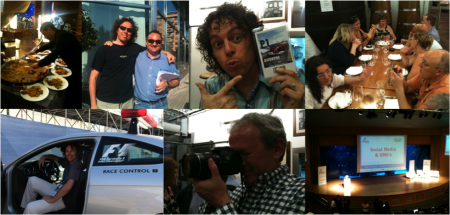
Making the media trip social
Valencia Tourism innovated the traditional trip by creating a place for these professionals to collaborate, discuss, debate and most of all develop new relationships. Social Media professionals are social by definition and unlike traditional journalists who are more driven by exclusivity, bloggers understand their individual success is strengthened by the success of their relationships and their network.Taking advantage of educational opportunities
The place to kick-off the discussion was at a conference where attendees presented a topic related to their area of expertise (videos of presentations here). The event was attended by many local, national DMO’s and operators. A great way to get Tourism Valencia’s stakeholders access to the knowledge in the group.Fostering the creation of networks
Over the next few days we got to know each other very well. There was enough time and opportunity to do so. We discussed and debated all topics digital travel professionals are interested in. And everything was tweeted in real time of course, creating a surge of Valencia exposure in real time, across many people’s personal and professional networks.
Creating remarkable experiences
Remarkable experiences turn into social objects, shared in social media. These are the things worth blogging, tweeting and Facebooking about. There were plenty in Valencia. Walking on top of a shark tank, eating the best Paella, incredibly photogenic modern architecture, random bars, more great food and of course the F1 race.Remarkable experiences was also the subject of my presentation, summarized in this interview
Build in surprises
Exclusive access, or including things money can’t buy will generate even more conversations. The trip offered personalized surprises such as a visit to the F1 paddock, a ride down the track in the safety car and even a drive in a converted 3-seater Formula One car for some.Results
The tally so far? By the last count I’ve heard a while back a few dozen blog posts have been written, 61 YouTube videos created, 363 people tweeted 1,558 tweets reaching over 2 million people all around the world while articles in traditional media are being written.But the real value is not just the immediate exposure but the fact that Valencia sits at the centre of a strong network of travel bloggers and tourism professionals including their expended networks. Valencia will always be top op mind when I connect with any of the new friends I’ve made.
Promoting by focussing on building networks and putting yourself in the middle of it. That’s the future. Valencia has re-invented itself over the last years with new tourism attractions, infrastructure and mega-events. They’re doing the same with destination marketing.
Congratulations Joantxo and Arantxa, you’re setting the new standard for travel media.

Valencia’s City of Arts and Sciences – Photo by Sherry Ott -
Experience Design, Marketing, Travel & Tourism
Customer Complaints are Awesome
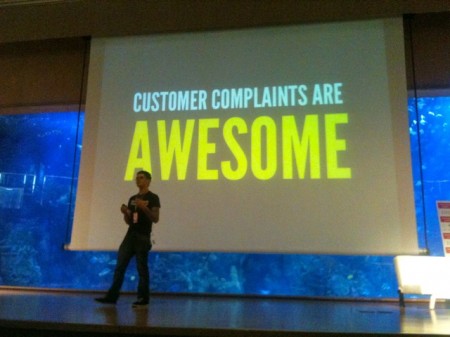
This was one of the messages from John O’Nolan‘s fantastic presentation at the DMO’s and social media conference in Valancia last week.
John rightfully pointed out that when people care enough about your product, take time out of their day and go through the effort to tell you that you need to fix a problem, it probably means they care and want you to succeed.
This is a huge opportunity. Fix the problem, invite them back and you might have a customer for life, and an advocate for your business.
That’s marketing.
I can’t wait for his book ‘Designing Emotion‘ to come out.
-
Experience Design, Marketing, social media, Travel & Tourism
Meh
I often hear from hotel operators that negative reviews on Tripadvisor usually aren’t from their typical customers. A 4-star hotel receives bad reviews from customers who got a deal on a discount website because of high parking fees and the expensive restaurant. A family oriented hotel receives bad reviews from business traveler who complain about the noise from the kids playing in the pool.
I use the chart below in some of my presentations:

There are a lot of people will love your product and a lot of people who probably won’t. The people who love of hate your product are the people who will talk about you in social media. The people in the middle shrug their shoulders and won’t mention you either way.
Two lessons from this chart:
- Stop marketing to people on the right side of this bell curve. They might deliver short-term cash flow but hurt your business in the long run.
- Moving the curve a little bit to the left will increase the number of positive conversations and grow your business through word-of-mouth.
-
Marketing, social media, Think! Social Media, Travel & Tourism
The story of our Super Bowl Social Media Campaign that got 2.4 million people talking
02.01.11 | Permalink | 9 CommentsThis is the story about the ‘Mystery Man’ campaign we ran on behalf of the Dallas Convention & Visitors Bureau last week. It’s a story of the power of social media, passionate communities and bringing people together. We knew it was a great idea but the results exceeded our wildest imagination.
Background
Social Media is about sharing and bringing people together. When the Dallas CVB asked us to design a campaign around Super Bowl XLV we thought ‘Why not use social media to get people talking to each other about Dallas?’.
At Think! Social Media, we work with the concept of passionate communities. These are groups of people connected through a shared passion. Engage a passionate community in the right way by offering something remarkable, and they will do the marketing for you through word-of-mouth.
The Big Idea
Needless to say, every NFL team has an extremely passionate community… and offering a chance to win Super Bowl tickets is pretty remarkable. Remarkable enough get people out into the street talking to each other.
We decided to send a Mystery Man to each city of the teams who made it to the Super Bowl. The first person to find the Mystery Man and tell him the secret phrase, ‘Have you been to Dallas lately?’ would instantly win tickets to the big game, 4 nights accommodation, tickets to the NFL experience and some cash towards travel.
The Process
We researched NFL and travel/lifestyle bloggers in each city and asked them if they would like to participate. As “Exclusive Bloggers”, their role would be to share daily clues about the location of the Mystery Man. We were careful in choosing bloggers that have strong social media presences and very engaged readers. We chose 5 in Green Bay and 4 in Pittsburgh. Their role was crucial in tapping into the existing communities and raising awareness about the campaign.
The clues tied in to imagery and facts about attractions in Dallas and became increasingly specific as the weekend went on. By printing the clues on photos they were easy to share through Twitter, and were eye-catching on the blogs and Facebook.
The secret password could only be revealed by ‘liking’ the Visit Dallas Facebook Fan Page. A campaign Twitter account (@DallasSBHunt) was created to coordinate all activities, answer questions and share the latest updates. In addition two hashtags (#SBHuntGB and #SBHuntPGH) were introduced to facilitate discussion around the contest.
Results
Sunday
The conference finals were played on Sunday January 23. We were prepared for each of the 4 cities. At the end of Sunday we knew the contest would run in Green Bay and Pittsburgh.
Monday
We finalized the details of the contest and sent out materials to the bloggers so they could prepare their first blog posts announcing the contest. At this time we activated the contest tab on the Visit Dallas fan page which only had 600 fans.
Tuesday
By noon, the bloggers in each city had announced the contest.
Green Bay: Total Packers, Brent Farvre, Packers Club, Purple Pants Green Jersey, All Green Bay Packers
Pittsburgh: IheartPGH, Steelers Gab, Pittsburgh Sports and Mini Ponies
Slowly the word started to spread. At the end of Tuesday, the fanpage had grown to over 1,000 fans and the followers of the campaign Twitter account began to grow.
Wednesday/Thursday
We continued to build awareness over the next few days. By carefully listening in on Twitter, tapping in to relevant communites and joining the conversations where appropriate we were able to rapidly spread word of the contest. By Thursday, traditional media had gotten wind of what we were up to and a few stations began to report on the contest on the the nightly news. By the end of Thursday over 3000 people had liked the Visit Dallas page.
Friday
At 9am the Exclusive Bloggers announced their first clues and the contest began. We quickly learned that we had struck gold in both cities. The streets were full of people searching for our Mystery Man, many tweeting as they went and following along on Facebook. By Friday @DallasSBHunt was trending in both Pittsburgh and Green Bay.
Best of all, two whole cities were out on the streets talking to each other about Dallas.
That night, the hunt for the Dallas Mystery Man was the headline news on all the local stations (this is my favourite). The Visit Dallas Fan Page had grown to 8,000 fans and the campaign Twitter account had well over 1500 followers.
Saturday
We were lucky that Friday’s clues had been vague enough for our Mystery Men to keep from getting caught, but by Saturday the amount of people on the street made it significantly more difficult to make it through the city unnoticed.
Just after noon our Mystery Man in Green Bay was found and not long after our man in Pittsburgh was caught as well.
The hunt was over, but the ride wasn’t. The winners were invited on news shows (1, 2, 3, 4, 5) and countless blogs, websites, radio stations and news papers were reporting on the contest and its winners.
Sunday and beyond
The winners in Green Bay turned out to be a couple who are homeless and live in a local shelter. They were invited on Fox 11’s morning show to tell their story. Shortly thereafter CNN picked up the story and we had reports from our contacts all over North America (even as far as Australia) who saw the campaign on the news.
The Results
We definitely succeeded in getting people talking about Dallas. We also proved that when you run a Social Media campaign within passionate communities, you don’t need a big media budget. And, if the community is passionate enough, you’ll even make it on the news.
We grew the Visit Dallas Fan Page by almost 10,000 fans in three days. The fanpage received about 100,000 pageviews and generated over 500,000 news feed impressions.
But what we’re most proud of is the incredible positive reaction from the people in Green Bay and Pittsburgh. We received many messages from individuals telling Dallas how much they enjoyed the weekend.

We want to thank the Dallas CVB for giving us the opportunity to execute our crazy idea and give a big thank you to all the local bloggers and the great people of Green Bay and Pittsburgh. May the best team win on Sunday!
This entry is cross-posted on the Think! Social Media blog.
-
Management, social media, Think! Social Media
Research: Social Media Boutiques are Winning Deals Over Traditional Digital Agencies
Interesting post from Jeremiah Owyang today about his research findings that Social Media Boutiques are Winning Deals Over Traditional Digital Agencies. And although I think the line between traditional, digital and social media agencies is a lot more blurred than the post suggests, it’s an interesting read.
Jeremiah’s research concludes that especially the clients who are more advanced in social media leave traditional agencies for boutique agencies for the following reasons:
- Offer a specialized skillset in new media and social business that traditional agencies may not offer
- Often offer change management within the corporations –traditional agencies have a reputation for layering social media on top of existing campaigns.
- Rather than be ‘campaign’ focused, instead are more long term focused such as building a community with customers for the long term.
- Are ready to roll up sleeves to assist with deeper customer engagement –not just deploy traditional advertising (one of the top spends in social business)
- Are more agile within smaller teams and can quickly maneuver as the technology space changes over time.
- Fundamentally are geared to measure differently around engagement, and what it means –not just top line and bottom line measurements
I would add to that list that ‘traditional’ agencies often lack the culture necessary to really make social media (or digital for that matter) work.
<plug>
And at Think! Social Media we can add a specialized focus on the travel, tourism and hospitality industry as well. This industry isn’t easy to figure out and you need to understand the specifics in order to deliver real value to your clients.
</plug>
Jeremiah also identifies some weaknesses boutique agencies can have:
Despite their strengths, Social Media Boutiques have weakenesses. They are often unable to scale as engagement is difficult to roll out to all product units and around the globe, are quickly finding that traditional agencies are catching up by training staff (see how Edelman has an internal black belt education program) and often lack the ability to achieve an integrated marketing approach.At Think! we’re already rapidly expanding to offer full digital services with integrated social media. We’re achieving this though great partnerships (including ‘traditional’ agencies) and by acquiring new talent, here in Vancouver, but also around the world.
It’s safe to say that 2011 will be very exciting.
-
Internet, social media, Travel & Tourism
You’re already in social media; ignore or engage

I still get questions from tourism businesses who aren’t sure if and how they should engage in social media. The answer is that you already are part of social media.
- People write reviews about your business on Tripadvisor
- People tweet about your experience on Twitter
- People check-in with your business on Foursquare
- People talk about your business on Facebook and post pictures
- etc
So the question is “to ignore” or “to engage”. Answer these questions:
- If a customer has a question or feedback at your front desk, do you ignore or engage?
- If somebody calls you with a question or feedback over the phone, do you ignore or engage?
How is social media any different?
-
Internet, Marketing, Travel & Tourism
Take-aways from VisitBritain’s social media presentation
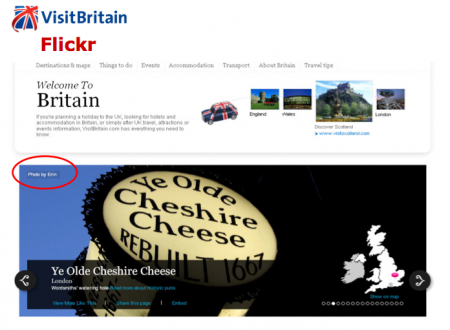
Somebody emailed me this webcast where Justin Reid from VisitBritain shares their social media strategy, examples, results and learning. Very insightful. Here are my key take-aways.
People don’t make a travel decision on a national tourism board website
Justin said: “Our research told us that the majority of long haul travelers visit a national tourist board after they’ve already made the decision to visit”
VisitBritain’s rightly concluded that in order to target people in the decision making process, they need to engage in other places like third party websites. A content partnership with Yahoo is working very well for them for example.
The future of CRM/eMail Marketing is under threat
Justin said: “Where previously you might have focused a lot of CRM activity we learned that the inbox is no longer a happy place. People want to clear it out as fast as possible. So we now want to focus on finding places where people are in the mindset of making decisions about travel [social media].”
I wondered about the same thing about a year ago in this blog post. As people become overwhelmed with email, they pay less attention to marketing messages, even when they opt-in. This kind of change won’t happen overnight but social media is an environment where people are easier to engage, two-way dialogue is possible and content is easy to share.
Social Media’s network effect has incredible reach
Justin: “10,000 followers is amazing. But we followed the traffic of some of our tweets and each of our tweets reaches a potential audience of about 325,000 people”
Through re-tweets on Twitter, and by tagging and sharing on Facebook, a message can travel far and wide in a very short period of time. And the content itself is much more credible because it’s endorsed by a friend who shared it.
Tourism Australia’s fanpage with over 600,000 fans is a good example. Every message they posts could be read by that many people. And for every person that comments on the post, the post gets published to their friend network, extending reach with the potential to organically grow their fanbase.
And as a side-effect, “Facebook is now the third largest referrer to VisitBritain after Google and Yahoo, and we’re not even seeking to push people to the website.”
Content is far more important than a website
Justin: “Our website is not the most important marketing tool for us, our content is. We’re just as happy if somebody reads our content on Yahoo as on our website.”
VisitBritain is agnostic about where content is being consumed and as a result, more of VisitBritains content is being consumed on third party websites. A partnership with Yahoo produces an exponential amount of views, for free. More videos are viewed than some market websites receive visitors.
Producing or gathering the right content, and pushing it out into place where you add value for the publisher and the consumer, preferably with easy sharing opportunities is much more effective than trying to generate website visitation through advertising alone.
User Generated Content is an easy and cost-effective way to publish content
Justin: “95% of VisitBritain’s photography comes from user generated content” and “when somebody’s photo appears on a national tourism boards site, you can bet on it they will send a link to all their friends to check it out.”
VisitBritain set-up a Flickr group called Love UK and is using it as one of the sources for its photos on VisitBritain.com. And because most people are happy to see their photography used, they will tell everybody about it.. on social media.
Brilliant. This is something I’ve advocated for years but I could never get it going. Well done VisitBritain.
Thanks for sharing Justin!
» Next Entries











